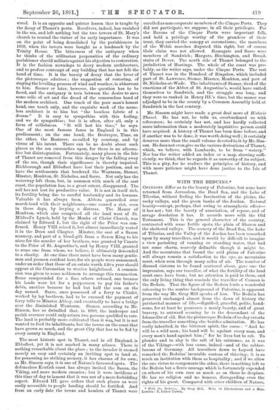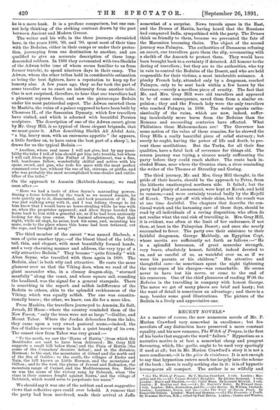WITH THE BEDUINS.*
OPINIONS differ as to the beauty of Palestine, but none have returned from Jerusalem, the Dead Sea, and the Lake of Tiberias, without feeling the fascination of the plains, the rocky valleys, and the green banks of the Jordan. Natural beauty—except, perhaps, that owing to atmospheric effect— it has not ; but the beauty of association, of repose, and of savage desolation it has. It accords more with the Old Testament. This is the general character of the country, contrasted with some fertile spots, the plain of Sharon and the sheltered valleys. The scenery of the Dead Sea, the Lake of Tiberias, and the Valley of the Jordan has been remarked upon by many travellers, and it would be difficult to imagine a view partaking of running or standing water, that had not some charm, scarcely definable though it might be. And the mountains that bound the arid plains of Palestine will always remain a satisfaction to the eye, as mountains must, when seen through many miles of air. The number of disused cisterns to be found scattered about, gave one the impression, says our traveller, of what the fertility of the land must once have been ; but no attention is paid to them, and the only living thing that reminds the traveller of Canaan is the Beduin. That the figure of the Beduin lends a wonderful colouring to the sombre background of Palestine, is apparent from the way Mr. Gray Hill speaks of him. The Beduin has- preserved unchanged almost from the dawn of history the patriarchal manner of life,—dignified, graceful, polite, hand- some, for at least he possesses a manly beauty, and of great bravery, to outward seeming he is the descendant of the Ishmaelite of old. But the picturesque Beduin of to-day extorts from the traveller something else besides admiration. He has verily inherited, in the bitterest spirit, the curse : "And he will be a wild man; his hand will be against every man, and every man's hand against him ;" for he lives but to rob. To plunder and to slay is the salt of his existence, as it was of the Vikings—with less cause, indeed—and of the robber- barons of Germany. All travellers down to Layard have remarked the Beduins' incurable custom of thieving ; it is as much an institution with them as hospitality ; and if we allow the one virtue to compensate the other, there is nothing left to the Beduin but a fierce courage which is fortunately expended on others of his own race as much as on those he despises. 'He has no religion and no honour, disregarding even the rights of his guest. Compared with other children of Nature, • With the Beduins. By Gray Hill. With 68 Illustrations and a Map. London: T. Fisher Unwin.
he is a mere husk. It is a profane comparison, but one can- not help thinking of the striking contrast drawn by the poet between Ancient and Modern Greece.
The writer and his wife, in the three journeys chronicled here, in the years 1888, '89, and '90, spent most of their time with the Beduins, either in their camps or under their protec- tion, journeying from one destination to another, and are qualified to give an accurate description of these long- descended robbers. In 1888 they covenanted with two Sheikhs of the Adwan tribe (one of whom seems familiar to us from former travels), to spend nineteen days in their camp. The Adwan, whom the other tribes hold in considerable estimation as being the best fighters, have a reputation to keep up for honesty also. A few years ago, they so far took the part of some traveller as to exact an indemnity from another tribe. One is not surprised, therefore, to hear that our travellers had a pleasant sojourn there, and saw the picturesque Beduin under his most patriarchal aspect. The Adwan escorted them to Mashita, the ruins of a palace supposed to have been built by Chosroes II., of the Sassanian Dynasty, which few travellers have visited, and which is adorned with beautiful Persian sculpture. The description of one of the Adwan escort, given by Mr. Gray Hill, is so typical of these elegant brigands, that we must quote it. After describing Sheikh All Abdul Aziz, " a big, heavy man, with an enormous appetite " (he appears, a little further on, to have eaten the best part of a sheep !), he draws for us the typical Beduin :-
"Another, whose real name I will not give, lest by any possi- bility the tales I tell of him should get him into trouble, but whom I will call Abou Seyne (the Father of Naughtiness), was a fine, tall, handsome fellow, wonderfully skilful and active with his spear, sword, and gun, who rode his mare with the most perfect command over her, without the use of bit, stirrups, or girths, and who was probably the most accomplished horse-stealer and cattle- lifter of the tribe."
On the approach to Ammlin (Rabboth-Ammon), we read soon after :-
"Here we had a taste of Abou Seyne's marauding powers. Seeing a horse tethered by the track as we neared Amman, he rode quietly up to it, dismounted, and took possession of it. He was just walking away with it, and I was telling George to let him know that I would have no horse-stealing while he was with us, when the proprietor appeared; and Abou Seyne handed the horse back to him with a graceful air, as if he had been anxiously looking for the true owner. We learned afterwards, that that night, while all slept, he arose, took his arms, and, mounting his mare, rode to the place where this horse had been tethered, cut the rope, and brought it away."
The third member of the escort " was named Shebeeb, a man of quite another type,—of the bluest blood of the tribe; tall, thin, and elegant, with most beautifully formed hands, and a very charming manner and address, the very type of a wily attractive Beduin." They became " quite friendly " with Abou Seyne, who travelled with them again in 1890. The Beduin, alas ! is both wily and attractive. He casts the same glamour over us that the Viking does, when we read of the giant marauder who, in a clumsy dragon-ship, " stormed manfully" along the coast, and whose square sail, rounding the headland, was the signal for a general stampede. There is something in the superb and selfish indifference of the Beduin to others, akin to the splendid recklessness of the Viking, which was equally selfish. The one was constitu- tionally brave ; the other, we know, can die for a mere idea.
From Mashita, the travellers journeyed to Ammila, Es Salt, Jerash, El Husn—where the country reminded them of the New Forest, " only the trees were not so large 7—Galilee, and Mount Tabor. Where the Jordan debouches from the lake, they came upon a very sweet pastoral scene,—indeed, the Sea of Galilee never seems to lack a quiet beauty of its own. The sunset view from Tabor was very grand:—
" To the north, we saw the 'Horns of Hattin' [from which the Beatitudes are said to have been delivered : Mr. Gray Hill suggests a small hill below them] and the Plain of Hattin [the scene of the Crusaders' decisive defeat], and in the distance, Hermon ; to the east, the mountains of Gilead and the north end of the Sea of Galilee; to the south, the villages of Endor and Nain, the hill known as Little Hermon, and the mountains of Gilboa ; and to the west, the plains of Jezreel and Esdraelon, the mountain range of Carmel, and the Mediterranean Sea. Below us was the scene of the victory sung by Deborah, when the stars in their courses fought against Sisera,' and the village of Debfirieh, which would seem to perpetuate her name."
We should say it was one of the noblest and most suggestive views that reflective eyes could ever behold. A rumour that the party had been murdered, made their arrival at Jaffa
somewhat of a surprise. News travels apace in the East, and the Druses of Hattin, having heard that the Russians had conquered India, sympathised with the party. The Druses
• think us friendly to them, because we prevented the fate of the MAronites becoming theirs. The object of the second journey was Palmyra. The authorities of Damascus refusing an escort, our travellers gave them the slip, covenanting with a sheikh of the Amezeh to protect them. They would have been brought back to a certainty if detected.. All honour to the daring of travellers ; but they are to the authorities, who try in vain to control the Beduins of the Desert, and who are held responsible for their victims, a most intolerable nuisance. A plucky French lady, attended only by a dragoman, reached Palmyra, only to be sent back within a few hours by the Governor,—surely a needless piece of cruelty. The fact that Mr. and Mrs. Gray •Hill were old travellers and appeared to be of some consequence, saved them from a similar ex- pulsion ; they and the French lady were the only travellers who reached Palmyra in 1889. The writer speaks enthu- siastically of the ruins, which are now, indeed, suffer- ing incalculably more harm from the Beduins than the Romans and succeeding centuries have effected. What Philistines these Mahommedans are ! The Governor has some notion of the value of these remains, for he showed the Gray Hills a really beautiful piece of relief statuary ; but surely he ought, having the power of life and death, to pre- vent these mutilations. But the Turks, for all their fine qualities, have a fatal lack of reverence for things old. The return journey was trying, a sirocco nearly suffocating the party before they could reach shelter. The route back in- cluded Homs, near where the Orontes rises, a river reminding the writer of the Thames at Streatley and Goring.
The third journey, Mr. and Mrs. Gray Hill thought, in the pride of their hearts, should be the approach to Petra, from the hitherto unattempted northern side. It failed ; but the party had plenty of amusement, were kept at Kerak, and held to ransom,—and were certainly treated badly by the Mejelli of Kerak. They got off with whole skins, but the result was at one time doubtful. The chapters that describe the con- tinual watch and the harassing care of those days, should be read by all individuals of a roving disposition, who often do not realise what the real risk of travelling is. Mrs. Gray Hill, it is evident, was often at the limit of her endurance, if not then, at least in the Palmyrian Desert ; and once she nearly succumbed to fever. The party owe their existence to their faithful dragoman, George Mabbedy, an Egyptian Copt, whose merits are sufficiently set forth as follows :—" He is a splendid horseman, of great muscular strength, very brave, absolutely honest, faithful, indeed devoted to us, and as careful of us, as watchful over us, as if we were his parents or his children." His attentive and thoughtful care—he sometimes spent the night tightening the tent-ropes of his charges—was remarkable. He seems never to have lost his nerve, or come to the end of his resources. One of the chief pleasures of reading With the Beduins is the travelling in company with honest George. The notes we get of many places are brief and hasty ; but the want of detail is sometimes an advantage ; and there is a map, besides some good illustrations. The picture of the Beduin is a lively and appreciative one.



































 Previous page
Previous page